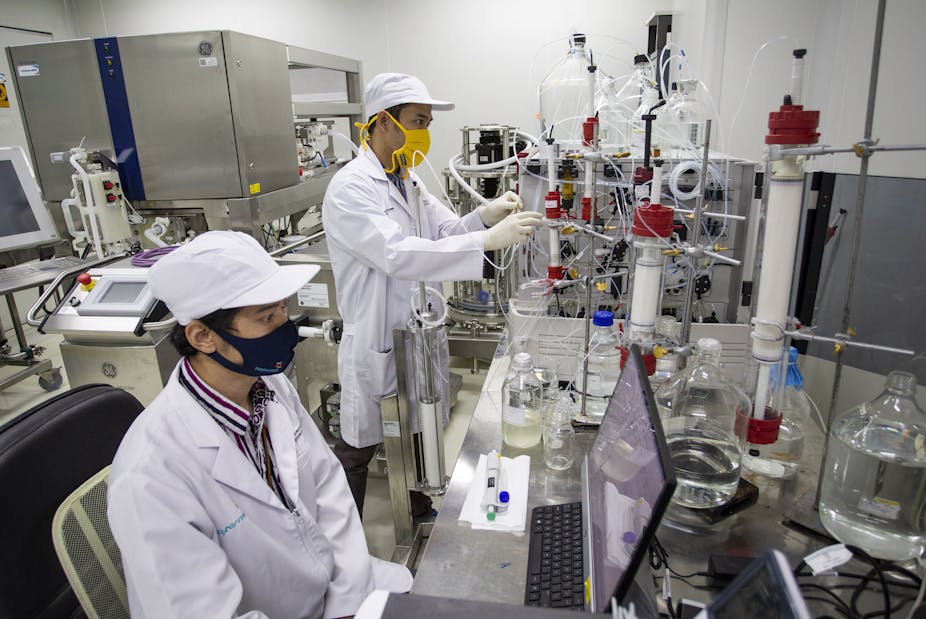The Indonesian government has an ambitious plan to deliver COVID-19 vaccines from early next year, but many Indonesians may not get access to vaccines any time soon.
That’s in large part due to uncertainty in COVID-19 vaccine development. Many might fail to work..
Rich countries have pre-purchased more than half of the future supply of the most promising COVID-19 vaccine candidates, which leaves Indonesia at a disadvantage.
Delaying Indonesians’ access to vaccination will not only lead to deaths. It will also cause huge economic loss.
I estimate that a six-month delay in delivery of COVID-19 vaccines will cost Southeast Asia’s largest economy at least Rp657 trilion (US$44 billion). This is equivalent to 4.1% of Indonesia’s total value of goods and services (Gross Domestic Product (GDP) in 2019.
Cost calculation
I did a comparative analysis by creating three economic simulations. The first scenario is “business as usual”, simulating the economy under normal conditions as if there was no COVID-19 pandemic. The second scenario envisions Indonesia getting its vaccines earlier. And the third scenario, delayed access to vaccination.
Indonesia’s President Joko “Jokowi” Widodo recently said said the first vaccine would be ready as soon as January 2021. I assume that the government needs at least six months to distribute all the doses.
In the second scenario, I assume Indonesia will complete its vaccines delivery by mid-2021. In the third scenario, Indonesia completes its COVID-19 immunisation program six months later, by the end of 2021.
I analysed these three scenarios using a Computable General Equilibrium (CGE) model. CGE is an economic model that combines economic theory with real economic data to estimate how an economy might react to changes in external factors such as the COVID-19 pandemic. This model has been widely used in policy analysis to calculate the impact of such external factors.
Under the pandemic scenario, Indonesia’s GDP in 2020 would be 7.2% lower than the business as usual scenario.
The economy is slowing down significantly due to social distancing and other health measures aimed at containing the virus, forcing some businesses to close or reduce activity. The figure is obtained by injecting the latest leading indicator data of retail sales index and Google community mobility report to the CGE model, while assuming the “new normal” situation will last until the end of the year
The model also estimates a 4.9% productivity loss during 2020, because parts of the population are unable to work, and machines cannot operate at normal capacity. In the CGE model, the productivity returns into its normal level once the vaccination program is completed.
If Indonesia completes its vaccine delivery program in mid-2021, its GDP in 2021 will be 4.8% lower than it would be if there was no pandemic. The downtrend will continue in 2022, with the GDP expected to be 1.7% lower. This means the 2020-2022 accumulated economic loss would be at staggering Rp2.393 trillion when compared to a scenario in which there was no pandemic.
The loss due to workers losing their jobs or parts of their working hours as industries are forced to make cuts or close their production during 2020-2022.
This loss is also almost equal to five times the money needed to construct Trans Sumatera Highway in Indonesia’s western most island, or more than six times the government’s poverty reduction budget last year. Thus, the pandemic has been a major threat not only to public health but also to Indonesia’s social and economic welfare.
However, if Indonesia delays delivering its vaccination program, the potential economic loss would be even larger. If Indonesia completed its immunisation program by the end of 2021, its 2021 and 2022 GDP would be 8% and 2% lower, respectively, than it would be under normal conditions. That means the 2020-2022 accumulated economic loss would be Rp3.050 trillion.
By comparing the accumulated economic loss of the early vaccination scenario with delayed vaccination scenario, it is estimated that a six-month late vaccination will cause an additional economic loss of Rp657 trillion during 2020-2022.
Beyond its short-term impact, deep recessions triggered by the pandemic are also to leave lasting scars on the economy. Loss accumulates over time, threatening prospects of long-term poverty reduction in Indonesia.
Policy implications
To avoid higher casualties and larger economic losses, the country should secure more vaccine supplies and arrange an effective schedule for a mass immunisation program.
Indonesia, so far, has gone in the right direction by allocating US$2.8 billion for the development, production, and procurement of COVID-19 vaccines.
Local pharmaceutical companies have also teamed up with global manufacturers in the hunt for COVID-19 vaccines for Indonesia. Indonesia’s pharmaceutical holding company Bio Farma has teamed up with China-based drug firm Sinovac Biotech to conduct phase III clinical trials for its vaccines, while local drug company Kalbe Farma has teamed up with Genexine Inc. from South Korea to start its phase II clinical trials.
The next step is to ensure fast and equal access to vaccines for the entire population.


